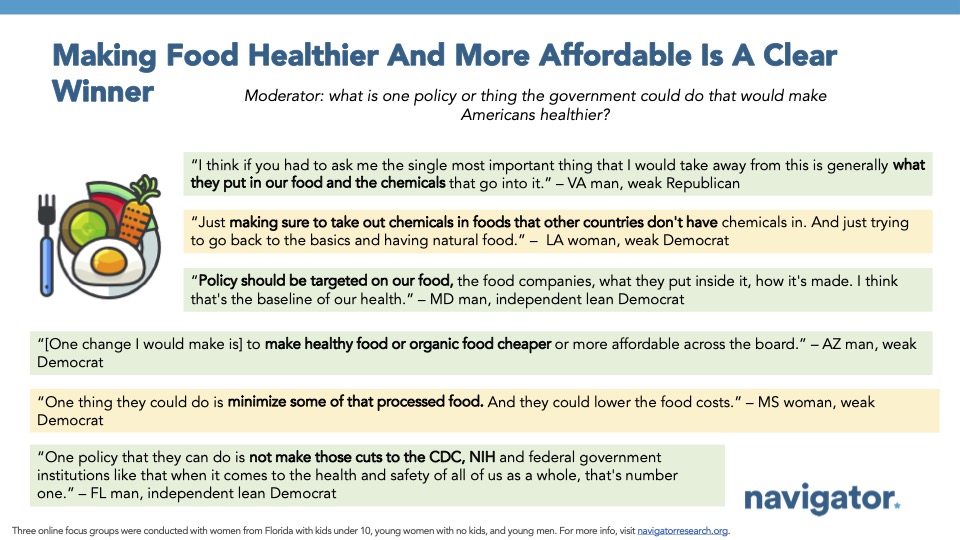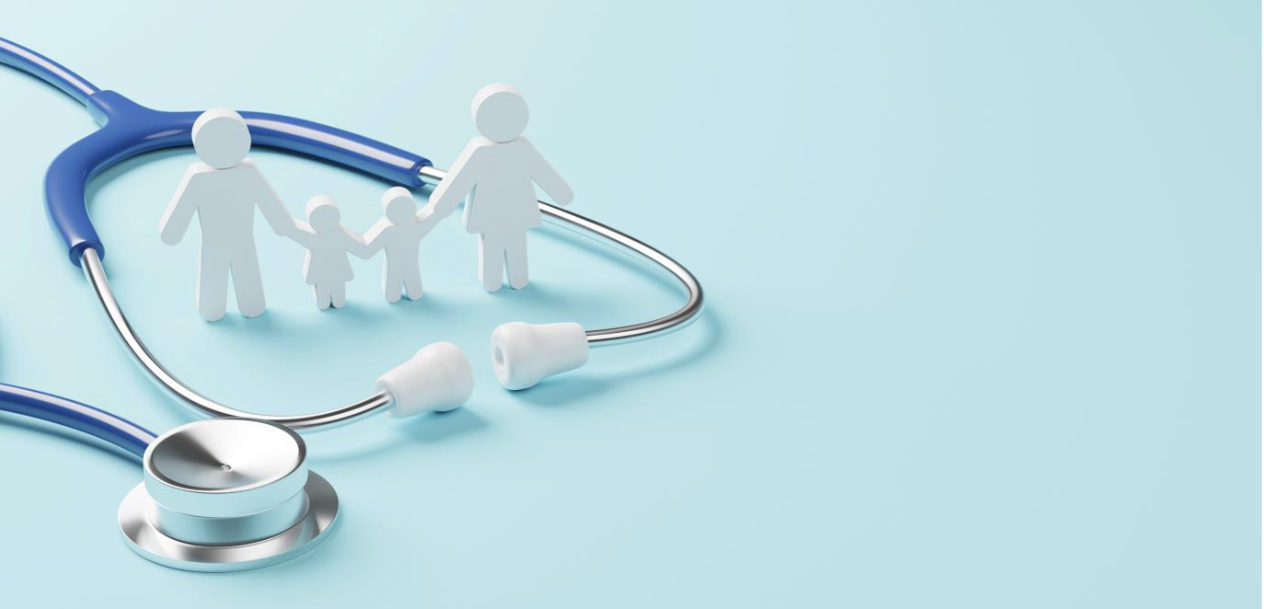FOCUS GROUPS: MAHA
This Navigator Research report covers focus groups conducted among “MAHA-Curious” Americans* on the state of the health and wellness in the country today, including where they look to for information and how they assess the “Make America Healthy Again” (MAHA) movement.
Last month, we explored Americans’ views of health and wellness in the country and the MAHA movement. In assessing trusted sources, treatment type, and the government’s role in health, we segmented the electorate into institutionalists, MAHA-loyalists, and finally the “MAHA Curious”—those who are somewhat skeptical of our health system but not completely against institutions and traditional medicine. We explore how this cohort is thinking about MAHA and its goals in focus groups.
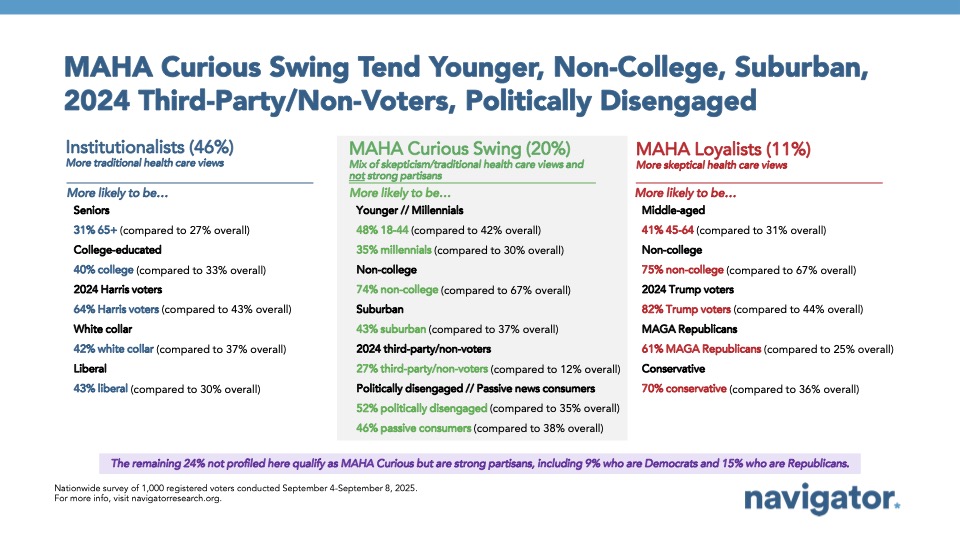
MAHA curious participants were deeply pessimistic about the state of health care in the country today, mainly due to exorbitant and unpredictable costs.
“I don’t think anything is going well as far as health care from my personal experience. Just even the emergency room, long waits, you get a diagnosis, but it’s just a quick fix. The long wait time to see doctors, the copays, it’s a lot.” – Florida woman, independent
“It’s very expensive. If I get an injury, the first thing I’m thinking is do not call me the ambulance. I don’t got money to pay for that, so it’s very expensive.” – Maryland man, independent lean Democrat
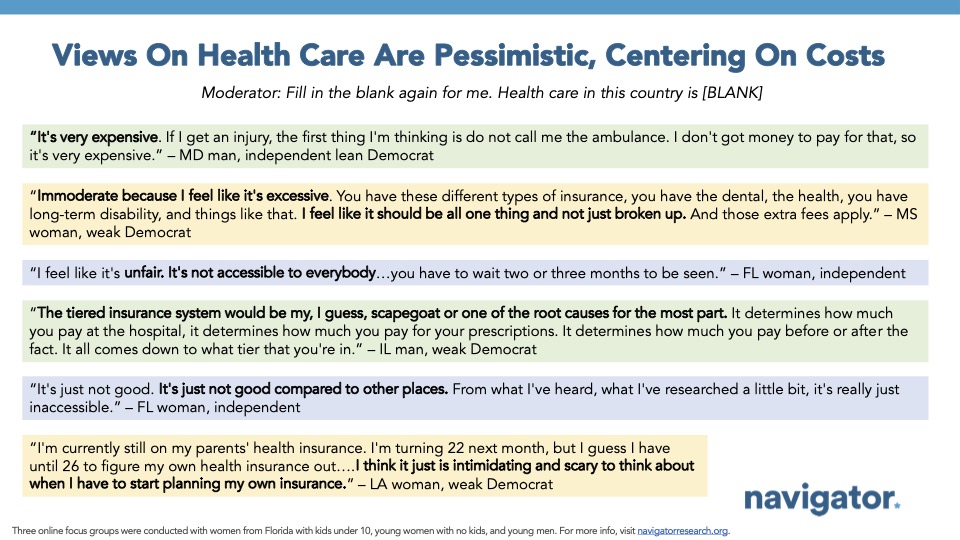
The problems are less related to the quality of care, and more about access and finding the right care.
“I think it’s broken because, like everyone else said, it’s extremely expensive, it’s hard to actually get care… It can take forever to actually get an appointment, even if they have the type of doctor that you need to see, if it’s a specialist.” – California woman, independent lean Democrat
“The doctors are usually very well here. It’s just the coverage and sometimes you’ll get a denial and you have to go back for another doctor’s visit just to get the right paperwork. Or they deem it unnecessary and it’s actually very necessary. You’re trying to take care of your health and be proactive.” – Florida woman, independent
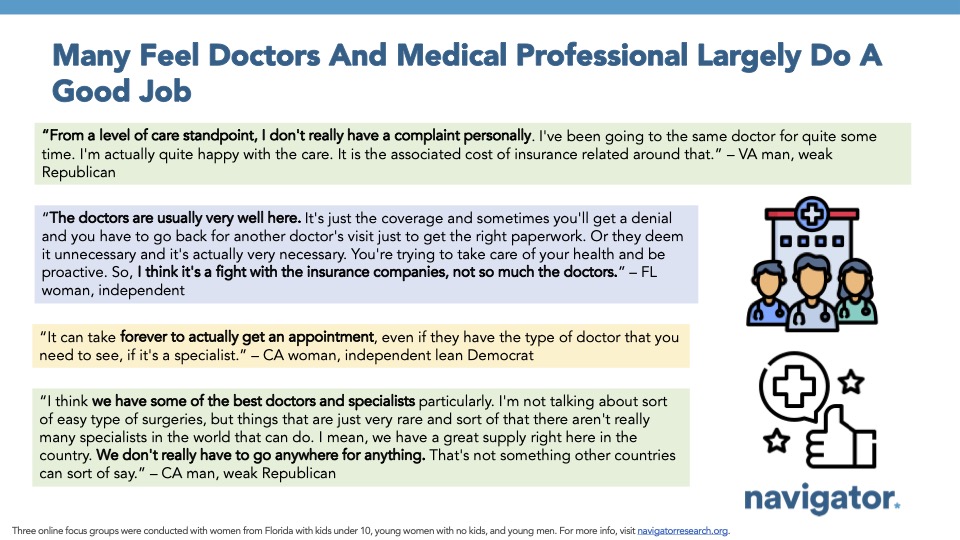
As a result, many participants turn to social media, Google, and AI for questions related to health and wellness.
“I normally go to the Health MD or I go to the orgs, like the ones that is verified… Like professionalized sources that is backed up with statistics and scientific information.” – Mississippi woman, weak Democrat
“I usually follow holistic accounts on TikTok and creators. And if I have a question, I will reference ChatGPT.” – Florida woman, independent
“I have a lot of YouTube subscriptions, so there’s a lot of people I watch on YouTube. I read Reddit a lot, so Reddit, and then I read medical journals, stuff like that.” – Illinois man, weak Democrat
“My mom and dad. They’re my go-tos, but yeah, ChatGPT as well has been my go-to.” – Florida man, independent lean Democrat
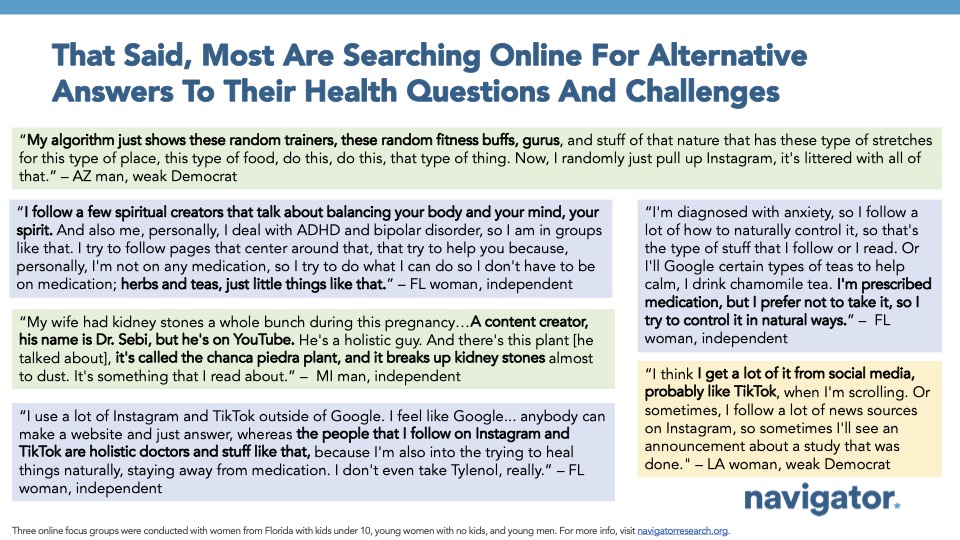
These sources can sometimes lead participants to bring questions to doctors or change their care.
“I also get a lot of my health information from social media, which will lead me to look it up on Google and then if I’m kind of confused with my answers, because sometimes you get yeses and nos back to back and then you’re wondering which one’s correct. So then I’ll take it to my doctor and I’ll be like, ‘What do you think?’ So kind of ends there.” – Pennsylvania woman, weak Democrat
“I actually was thinking that I’ve seen that birth control, the pill can lead to cancer. I saw that in a post and I’m on the pill and I think I had an appointment with my gynecologist not too long after, and I don’t know if I said it directly, but I think it’s encouraged me to want to go off of the pill sooner and maybe go more towards an IUD.” – Louisiana woman, weak Democrat
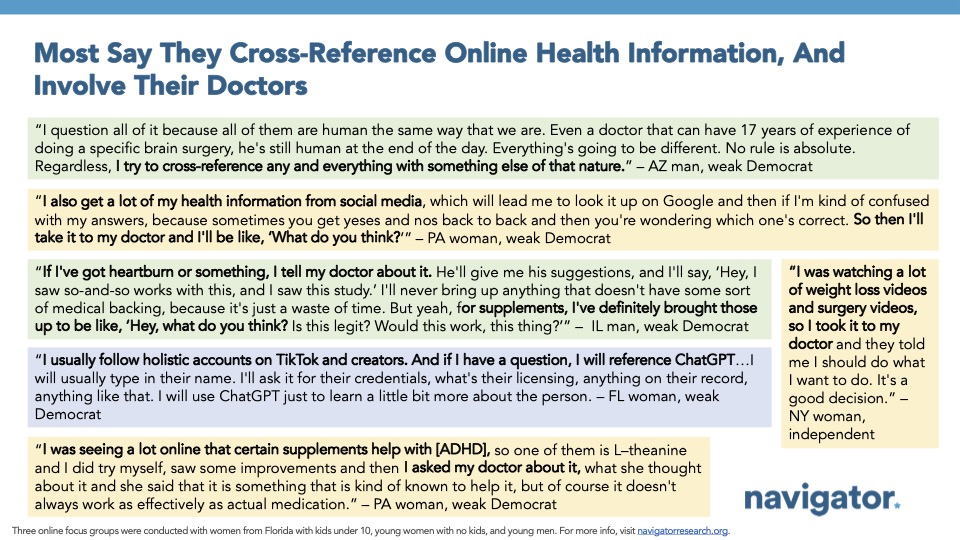
These participants overwhelmingly believe Americans are less healthy than they were 20 years ago, largely as a result of food.
“Everything has changed, the food has changed, everything has sugar, and it’s just… Yeah, if you cough, you gain weight. It’s too much.” – New York woman, independent
“When you look at trends over time, there are some things that have improved, but across the board, chronic issues or health, lifestyle issues, like diabetes, things like that, have been, like drug deaths, those have been on the rise.” – Wisconsin woman, independent lean Republican
“There’s a clear difference between what’s allowed in our food versus around the world, different countries that they have around not letting certain things into there. So, I think there’s a couple different things contribute to us being less healthy culturally.” – Virginia man, weak Republican
“I don’t feel food is real food anymore. A lot of it is, even in fruits and vegetables, there’s so much pesticides that I don’t think was in there 10 years ago, meats, all that. Also, people who can’t afford to eat fresh fruits and vegetables, they rely on a lot of rice or junk food that’s cheaper but filling at least.” – Florida woman, weak Democrat
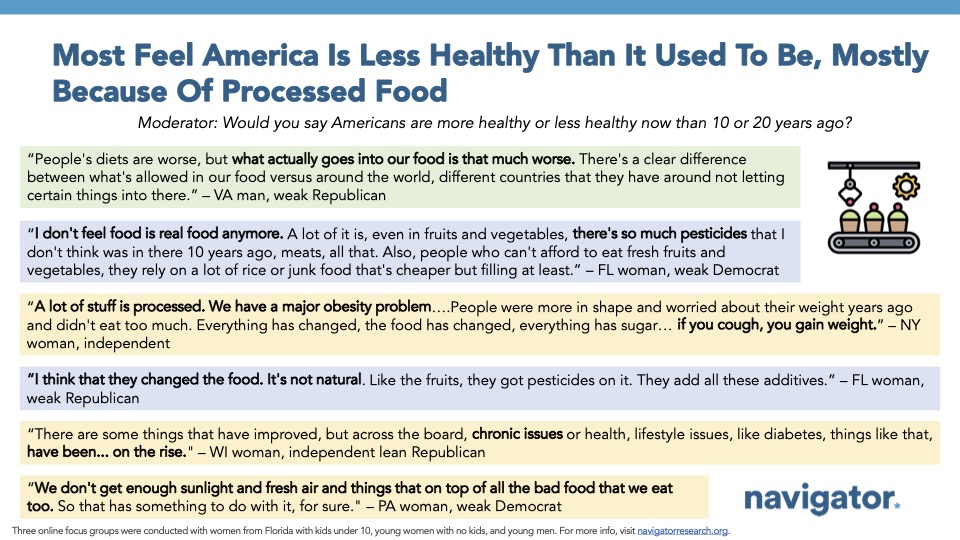
The goal of making America healthy is indisputably positive to these participants, but they do question the MAHA movement’s agenda. RFK Jr. is mostly known and has mixed perceptions.
“When you take those words for their literal meaning, I agree with it. I don’t know about again, but make America healthy or do healthy things, reduce our consumption of unhealthy foods, toxins… I don’t think anybody would be opposed to that.” – California man, weak Republican
“Some of this feels very political. Some of this does not seem very factually scientific based. And I don’t know if I have specific examples as I sit here today, but just kind of seeing some of the stuff that comes out in the media… With RFK and Trump’s support in this… I do question what the true intent of this is. Is it truly to Make America Healthy Again, or are there other ulterior motives at play here?” – Virginia man, weak Republican
“It’s RFK Junior’s I guess campaign to change the way that healthcare works in America. A lot of it is trying to move away from, let’s be honest, proven remedies towards unproven holistic. There’s some fad diet stuff in there as well that’s becoming more popular and I think the most recent result of the campaign was the declaration that there is a linkage between Tylenol taken during pregnancy and autism, there’s multiple studies on that.” – Wisconsin woman, independent lean Republican
“I just find it a little bit touch and go with what he wants to do in terms of attending to pollution….[RFK] took his family to go walking in and swimming in a creek. And it was some of the dirtiest water ever that no one would ever touch in Washington, D.C. So I just think, ‘okay, is there really a leg to stand on when it comes to all of this pollution?’” – FL man, independent lean Democrat
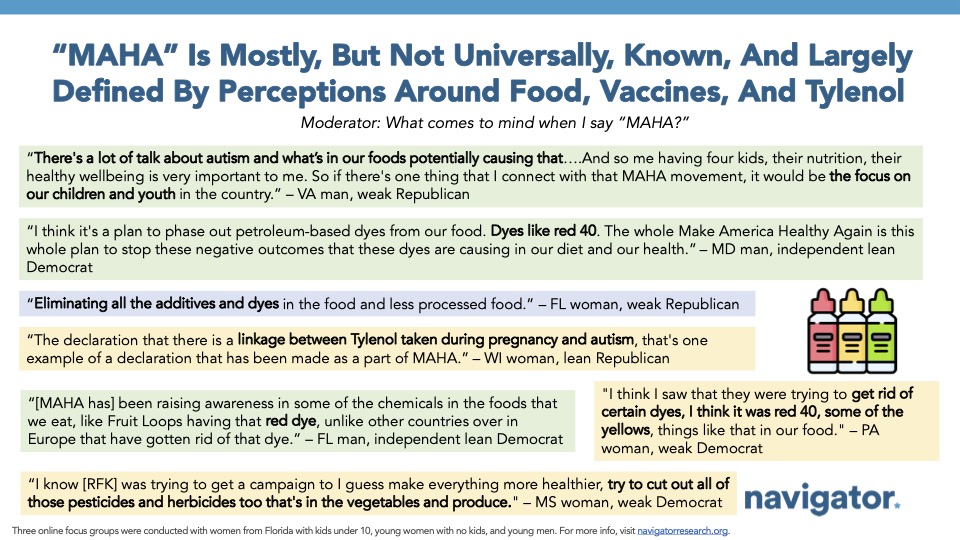
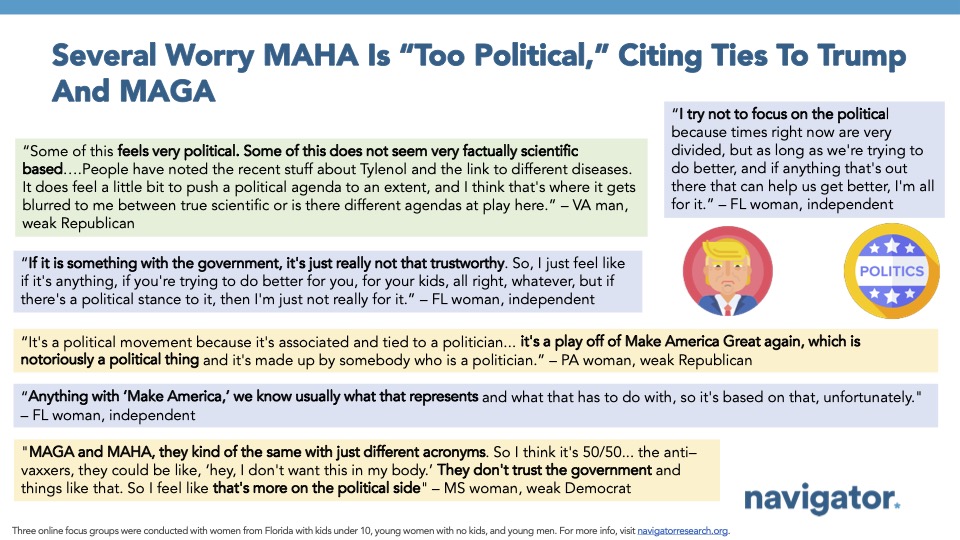
MAHA’s anti-vaccine sentiment alarms some, but importantly, they want to be able to make those decisions for themselves and their families.
“When I hear Make America Healthy Again, I also think about what they’re saying about vaccines at the moment. And I know that some vaccines are created to make America healthy, to diminish chicken pox, and measles, and polio, and things like that. I do think everybody should have a choice on what to put in their body. I’m big on that. What you want to put in your body is your choice and for your child, as well. And maybe vaccines should be spread out, but I don’t know if leading in that way not to do them at all is right either.” – Florida woman, independent
“I think the parents should decide if their kids should have it or not, and then I think that the parents should give it to them. I’m really half-and-half on that.” – Florida woman, weak Republican
“They’re creating a bit, I would say, hesitancy towards vaccines. I don’t think they’ve ever said, ‘Don’t get vaccinated,’ but they’re spreading them out. I think they have some interesting points on certain vaccines maybe, particularly Hep B.” – California man, weak Republican
“I’m a bit worried that if there’s overall lack of societal trust, if we get messaging coming out saying vaccines across the board aren’t safe, vaccines across the board aren’t good, that margin of people who will just not take any vaccines altogether or just not vaccinate their children, we’re going to lose some degree of our herd immunity and become vulnerable to diseases that were almost eradicated like 50 years ago.” – Wisconsin woman, independent lean Republican
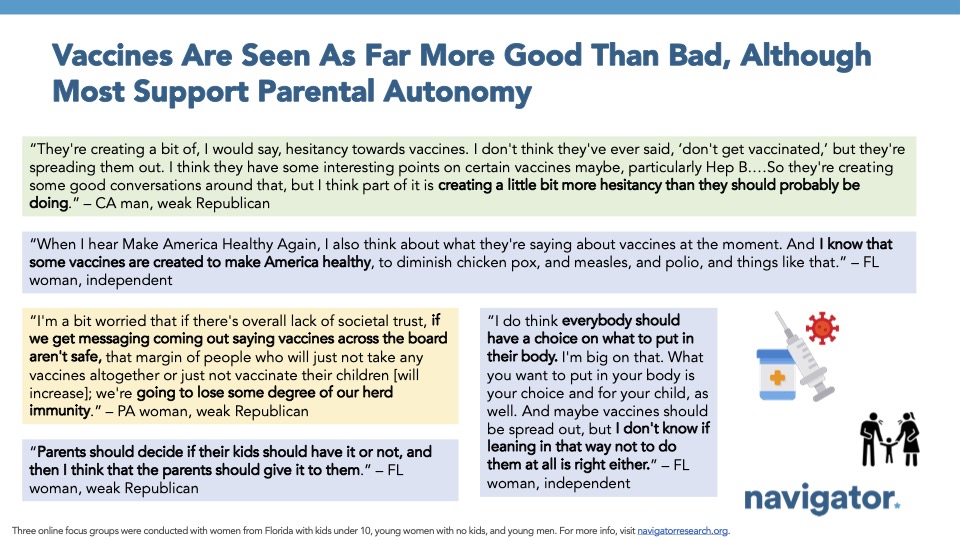
A clear consensus for how to tackle America’s health problems: make foods healthier and more affordable. The recent funding cuts to the health establishment are viewed overwhelmingly negatively.
“One policy that they can do is not make those cuts to the CDC, NIH and federal government institutions like that when it comes to the health and safety of all of us as a whole, that’s number one.” – Florida man, independent lean Democrat
“I think if you had to ask me the single most important thing that I would take away from this is generally what they put in our food and the chemicals that go into it.” – Virginia man, weak Republican
“To make healthy food or organic food cheaper or more affordable across the board.” – Arizona man, weak Democrat
“Policy should be targeted on our food, the food companies, what they put inside it, how it’s made. I think that’s the baseline of our health.” – Maryland man, independent lean Democrat
“Just making sure to take out chemicals in foods that other countries don’t have chemicals in. And just trying to go back to the basics and having natural food.” – Louisiana woman, weak Democrat
“I think an overhaul of the current for-profit insurance system is absolutely necessary.” – Wisconsin woman, independent lean Republican
